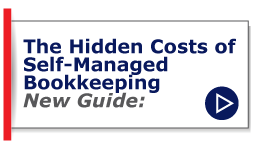
You value your small business, but are you doing all you can to ensure its security? Unfortunately, even seemingly small accounting oversights can put your company in jeopardy. Keep your small business on solid ground by avoiding these common accounting pitfalls.
1. Disorganized Expense Records/Lost Receipts
Misplacing business expense receipts can cause accounting and tax issues. Even if it is a legitimate business expense, loss of a receipt can result in incorrect reporting and a tax penalty if you’re audited. The solution? Designate one debit or credit card for all business expenses, and use a mobile app to record purchases as they happen, such as Tallie.2. Not Monitoring Receivables
Keep close track of your receivables to make sure you are being paid what you're owed. If you neglect this, you could have an end-of-year receivables report that doesn’t justify. You’ll then spend valuable time and energy on your receivables listing, potentially accrue debts and pay too much in taxes. Resolve to pursue outstanding balances diligently and update your records accordingly.3. Forgetting Cash Expenses
You may be very diligent about tracking your credit and debit expenses. However, in today’s digital society, it can be all too easy to overlook cash purchases. These expenses may go unrecorded and forgotten, resulting in an overstatement of income and too much paid in taxes. Solve this issue by creating an easy system for tracking cash expenditures like a logbook or smartphone app.
4. Mingling Personal and Professional Expenses
Another novice small business mistake is using the same credit or debit card for business and personal expenses, leading to headaches when tax time rolls around. Prevent this problem by never using your business card/account for personal expenses and vice versa.5. Not Consulting a Professional
Many small-business owners strive to save cash by doing their taxes by themselves; however, this could ultimately cost more money long-term. Neglecting deductions or underpaying taxes could result in monetary penalties now and/or in the future. A tax professional stays abreast of current tax laws and is an expert in getting small businesses all the breaks and deductions they deserve. Accuracy in accounting is key, and good accounting services can help you ensure that your books are accurate.














